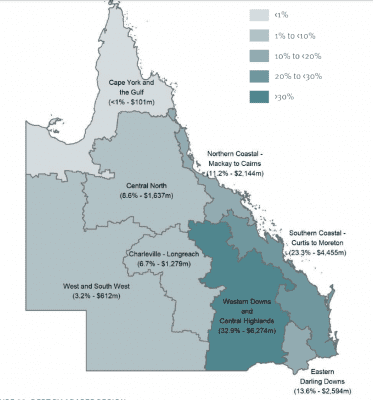Even before the COVID-19 pandemic this year, Queensland beef producers have continued to operate in a dynamic environment with many factors such as markets, weather and natural disasters impacting on their incomes and debt levels.
This is evident from the results of the 2019 Queensland Rural Debt Survey that was tabled in Parliament earlier this month which shows total rural debt has reached $19.10 billion, an increase of 10.75 per cent since the last survey in 2017, due largely to the persistent drought and the catastrophic Monsoon Trough event of early 2019.

Debt by ABARES region. Click to enlarge.
Beef debt, which represents 56 percent of total rural debt, increased by 14.10 per cent in 2019 with a similar increase in average debt per borrower (14.01 per cent).
Whilst a significant increase for the industry, the quality or rating of that beef debt had remained proportionally the same as the 2017 survey, with a majority (93%) of beef borrowers and value of beef debt rated viable (‘A’) or long-term viable (‘B+’).
The results reflect the resilience of beef producers even in challenging years, and the continuing strong rural land values that largely underpin that rural debt.
Unsurprisingly, the greatest level of beef debt was in the high beef producing region of Western Downs and Central Highlands, with 35.58 per cent of beef debt or $3.80 billion.
The Monsoon Trough event had a significant impact on Queensland beef production throughout 2019. Not only the loss of livestock but also the lack of follow up rain and pasture response, delaying the potential for recovery, particularly in the North West region.
Interestingly, even with the hardships the beef industry faced, Farm Management Deposits increased by 12.03 per cent over the same period with 3,073 beef accounts in Queensland at a value of $460.34 million at December 2019. However, this strong position was not seen in all agricultural industries and Farm Management Deposits overall increased just 2.03 per cent over the same period.
The Queensland Rural Debt Survey, which QRIDA undertakes every two years together with the Queensland Government Statisticians Office (QGSO) and all major rural lenders, ascertains the extent, nature and size of total rural debt in Queensland.
The most recent survey provides an important snapshot of the financial state of our rural industries and will help inform both government and industry. However, we recognise rural businesses operate in an active environment and debt levels will continue to be impacted.
Most farm businesses rely upon debt funding as a principal source of capital. Through the December 2017 to 2019 period, it has continued to be an important source of funds for working capital, capital infrastructure and investment for all primary produces.
Beef producers will continue to experience changes and challenges with yet more uncertainty including rapidly changing market conditions and supply chain constraints as well as opportunity for increased domestic demand due to the COVID-19 pandemic. The impacts are yet to be fully realised and the effects of it may be seen in the 2021 survey.
For a more detailed breakdown and analysis of rural debt in Queensland including the beef industry, visit www.qrida.qld.gov.au for your copy of the 2019 Queensland Rural Debt Survey.
- Corrie Feldman, Economist at the Queensland Rural and Industry Development Authority Rural and Industry
